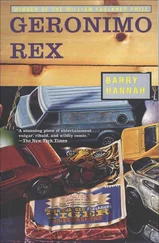“You ought to be dead,” said French.
“As graceful, powerful an exhibition of the grandest game as your old coach would ever hope to see! I saw some of the old tricks I taught you! Oh, son, son!” Dr. Word screamed.
Everyone knew he was ill then.
“Go home,” said French, looking very soon sorry as he said it.
“You come home and see us!” Word bellowed, and left.
French’s woman, Cecilia Emile, put her head on his chest. She was short, bosomy and pregnant, a Franco-Italian blessed with a fine large nose, the arrogance of which few men forgot. Next came her hair, a black field of delight. French had found her at LSU. They married almost on the spot. Her father was Fat Tim Emile, a low-key monopolist in pinball and wrestling concessions in New Orleans — filthy rich. Levaster did not know this. He stared at the strained hot eyes of French, having surrendered his body to the man, and French saw him.
“Baby Levaster? Is it you? From Vicksburg? You look terrible.”
“But you, you. .” Levaster tripped on a tape and fell into the green clay around Edward’s sneakers. “. . are beauty. . my youth memory elegant, forever!”
The Edwards took Levaster home to Covington, across the bridge. The Edwards lived in a great glassy house with a pool in back and tall pines hanging over.
French was sad. He said, “She still carries it on with him. They meet out in the Civil War park at night and go to it in those marble houses. One of my old high-school sweethearts saw them and wrote me about it. She wrote it to hurt me, and it did hurt me.”
“That old fart Word? Impossible. He’s too goddamn loud to carry on any secret rendezvous, for one thing. You could hear the bastard sigh from a half mile off.”
“My mother accepts him for what he is.”
“That man is destroyed by stroke.”
“I know. I gave it to him. She doesn’t care. She takes the limping and the bad arm and the hollering. He got under her skin.”
“I remember her,” Baby Levaster said. “Some handsome woman, auburn hair with a few gray ends. Forgive me, but I had teen-age dreams about her myself. I always thought she was waiting for a romance, living on the hope of something out there, something. . ”
“Don’t leave me, Baby. I need your mind with me. Somebody from the hometown. Somebody who knows.”
“I used to whip your little ass at tennis,” Levaster said.
“Yes.” French smiled. “You barely moved and I was running all over the court. You just stood there and knocked them everywhere like I was hitting into a fan.”
They became fast friends. Baby Levaster became an intern. He arrived sober at the funeral of the Edwards’ newborn son and saw the tiny black grave its coffin went into behind the Catholic chapel. He looked over to mourners at the fringe. There were Dr. Word and his brother Wilbur under a mimosa, lingering off fifty feet from the rest. Word held his beret to his heart. Levaster was very glad that French never saw Word. They all heard a loud voice, but Word was on the other side of the hill by then, bellowing his sympathetic distress to Wilbur, and the Edwards could not see him.
“Whose voice was that?” asked French.
“Just a voice,” said Levaster.
“Whose? Don’t I know it? It makes me sick.” French turned back to Cecilia, covered with a black veil, her handkerchief pressed to lips. Her child had been born with dysfunction of the involuntary muscles. Her eyes rose toward the hot null blue of the sky. French supported her. His gaze was angrier. It penetrated the careless heart of nature, right in there to its sullen root.
On the other side of the cemetery, Dr. Word closed the door of the car. Wilbur drove. Loyal to his brother to the end, almost deaf from the pitch of his voice, Wilbur wheeled the car with veteran patience. Dr. Word wiped his head and held the beret to his chest.
“Ah, Wilbur! They were so unlucky! Nowhere could there be a handsomer couple! They had every right to expect a little Odysseus! Ah, to see doubt and sorrow cloud the faces of those young lovers! Bereft of hope, philosophy!”
Wilbur reached under the seat for the pint of philosophy he had developed since his tour of Korea. It was cognac. The brotherly high music came, tasting of burnt plums, revealing the faces of old officer friends to him.
“James,” he said. “I think after this. . that this is the moment, now, to break it off with Olive — forever. Unless you want to see more doubt and sorrow cloud the face of your young friend.”
Word’s reply was curiously quiet.
“We cannot do what we cannot do. If she will not end it — and she will not — I cannot. Too deep a sense of joy, Wilbur. The whole quality of my life determined by it.”
“Ah, Jimmy,” Wilbur said, “you were just too long a queer. The first piece you found had to be permanent. She ain’t Cleopatra. If you’d just’ve started early, nailing the odd twat like the rest of us. .”
“I don’t want old soldier’s reason! No reason! I will not suffer that contamination! Though I love you!”
Dr. Word was hollering again. Wilbur drove them back to Vicksburg.
Cecilia was too frightened to have another child after she lost the first one. Her body would not carry one longer than a month. She was constantly pregnant for a while, and then she stopped conceiving. She began doing watercolors, the faintest violets and greens. French Edward took up the clarinet. Baby Levaster saw it: they were attempting to become art people. Cecilia was pitiful. French went beyond that into dreadfulness; ruesome honks poured from his horn. How wrong and unfortunate that they should have taken their grief into art, thought Levaster. It made them fools who were cut from glory’s cloth, who were charmed darlings of the sun.
“What do you think?” asked French, after he’d hacked a little ditty from Mozart into a hundred froggish leavings.
“Yes,” Dr. Levaster said. “I think I’ll look through some of Cissy’s pictures now.”
“You didn’t like it,” French said, downcast, even angry.
“When are you going to get into another tournament? Why sit around here revealing your scabs to me and the neighbors? You need to get out and hit the ball.”
French left, walked out, smoldering and spiteful. Baby Levaster remained there. He knocked on Cecilia’s door. She was at her spattered art desk working over a watercolor, her bare back to Levaster, her hair lying thick to the small of it, and below, her naked heels. Her efforts were thumbtacked around from ceiling to molding, arresting one with their meek, awkward redundancies, things so demure they resisted making an image against the retina. They were not even clouds; rather, the pale ghosts of clouds: the advent of stains, hardly noticeable against paper.
“I can’t turn around, but hello,” said Cecilia.
“What are all these about?”
“What do you think?”
“I don’t know. . smudges? The vagueness of all things?”
“They aren’t things. They’re emotions.”
“You mean hate, fear, desire, envy?”
“Yes. And triumph and despair.” She pointed.
“This is subtle. They look the same,” Levaster said.
“I know. I’m a nihilist.”
“You aren’t any such thing.”
“Oh? Why not?”
“Because you’ve combed your hair. You wanted me to come in here and discover that you’re a nihilist,” Levaster said.
“Nihilists can comb their hair.” She bit her lip, pouting.
“I’d like to see your chest. That’s art.”
“You toilet. Leave us alone.”
“Maybe if you are art, Cissy, you shouldn’t try to do art.”
“You want me to be just a decoration?”
“Yes,” Levaster said. “A decoration of the air. Decoration is more important than art.”
Читать дальше












